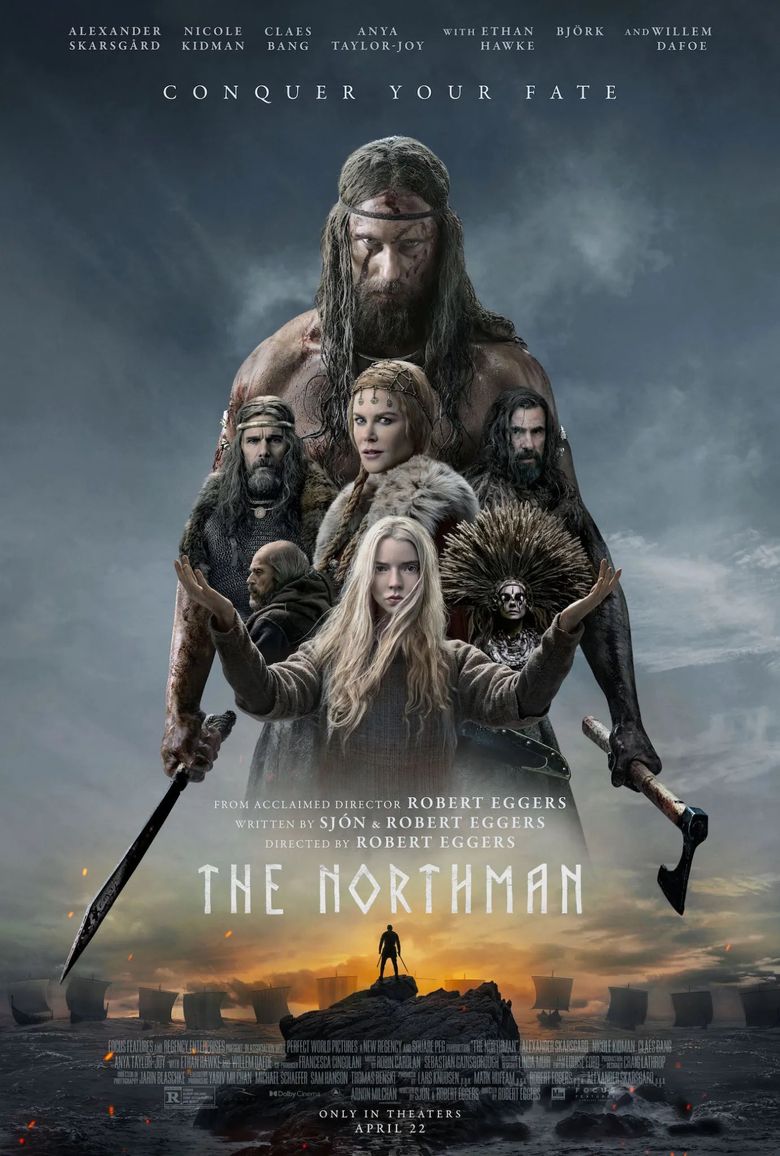This review contains spoilers.
Vikings, vikings, vikings—my weekly chant as my college friends and I would sit down to watch History’s Vikings. Since my Netflix queue has prevented me from checking out its sequel series Vikings: Valhalla, you can imagine how excited I was to see a trailer for The Northman, an epic staring Alexander Skarsgård and to see the age of vikings rendered in all its glory on the silver screen
The scale and pacing of the movie are compelling and suitably epic. As a young man, Prince Amleth’s childhood is interrupted by the murder of his father by his uncle, who then takes Amleth’s mother as his wife. Amleth’s legend provided the foundation for Hamlet, and the character arc does in fact feel like a transition from Simba to Hamlet to Inigo Montoya. Compared to the rollicking plots of Vikings, Amleth’s story was more single-minded and more serious. While both purport to depict the violent reality of warfare, they also depict Norse spiritualism.
The violence is animalistic and savage. As brutally as Amleth’s childhood is interrupted, his father’s death pales in comparison to a raid he makes on a Kievan Rus village. The cinematography—impressive throughout—shines in this scene as the camera follows a single warrior as he wades through the carnage around him, depicting the chaos of the battlefield without the impersonal flurry of close shots that we’re used to seeing.
It’s perhaps good that we aren’t sanitizing the violence of the viking age. But then again, given the film’s privileging of martial culture, is the extensive portrayal of rape and pillage almost a celebration of violence, justified as being simply part of the history?
The Northman joins a collection of recent media that commits to the idea of portraying the past in all its violent glory. Despite its flirtations with magic and spiritualism, the film is grounded in gritty realism, driven by the dark obsessions of modern audiences. The rebuttal from fans and filmmakers would seem to be that the work reflects the nature of the subject matter. Fair enough. But at times, it feels like this emphasis on “realism” is an excuse to reenact violence fantasies.
Or, perhaps I was just primed to be wary because of the context in which I watch it, with a man walking in just before it started announcing to the theater he was excited “because it’s his heritage.” I don’t want to make assumptions about his meaning, but I did find the comment unsettling. Henrik Ibsen and weird troll art are just as much part of Scandinavian heritage as the vikings. Emphasizing only the most brutal parts of one’s heritage is alarming, especially in an era of emboldened white nationalism and far-right obsessions with whiteness, masculinity, and violence.
Notably, the narrative stands in contrast to another recent big-budget historical epic, The Green Knight. Both films are centered on themes of agency and fate. But whereas Sir Gawain’s submission to destiny is a moment of growth, Amleth’s defining moment is a rejection of the future. After learning the agonizing and complex truth about his father’s death, the Norseman never grapples with the cycle of violence he’s perpetrating. Soon enough, the entire village is dead.
Perhaps this is right for the angry young man, whose whole life has been shaped by the trauma of his childhood. The moral calling of the viking warrior is vengeance and martial glory—it would be too jarring to watch Amleth give up his quest just because of new information. The film is an epic, but also a tragedy. But the source material bears only so much responsibility. The Norse were as well known for their bandit sagas as their revenge tales; they were as much as traders as slavers. We shouldn’t sanitize the vikings, but promoting violent fantasies carries its own baggage. Like most historical stories repackaged for mass audiences, The Northman was written for our times, not the age of vikings.
Next time I have HBO Max, I think I’ll check out Beforeigners—a deliberately ahistorical sci-fi series commenting on the links between past and present through viking immigrants to the modern era—as the appropriate follow-up.
